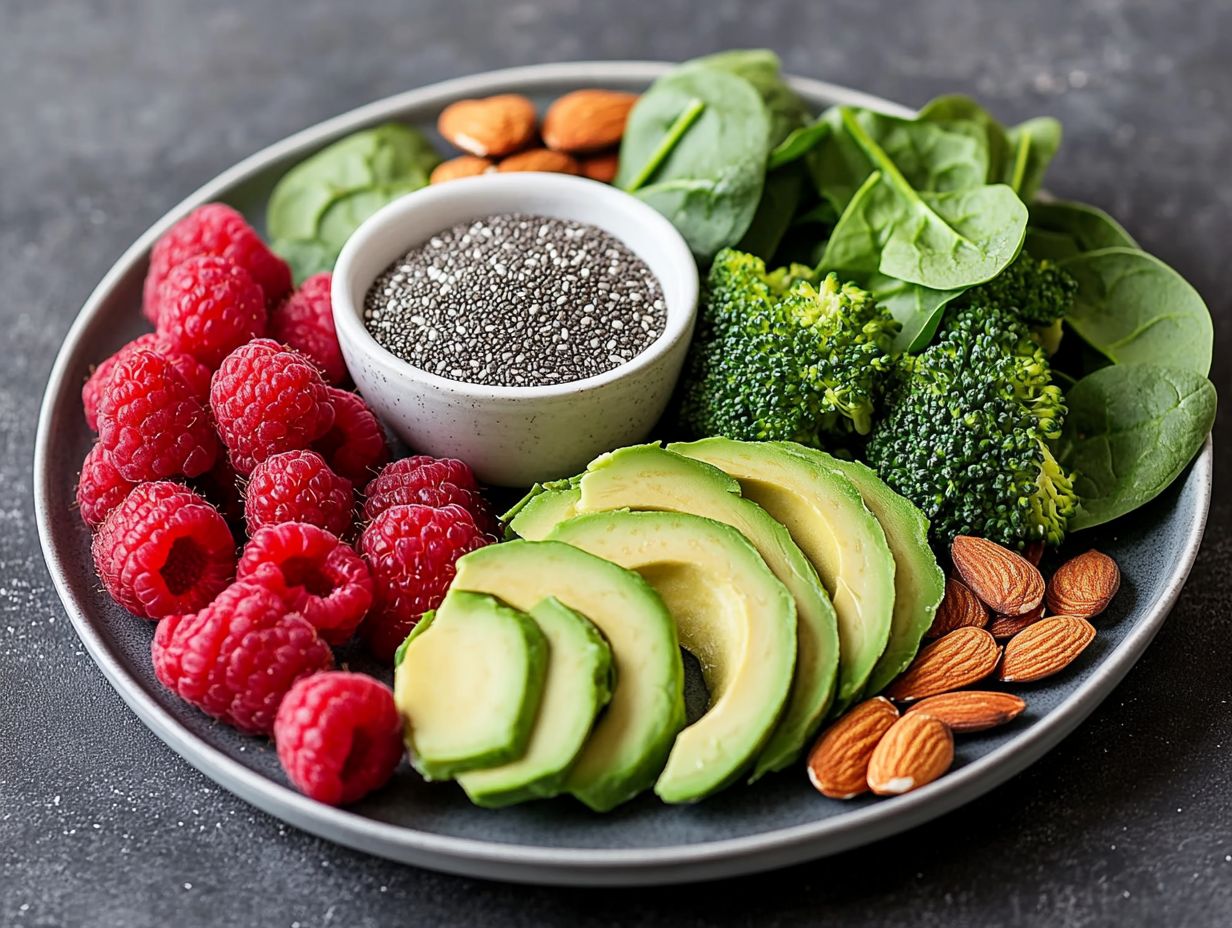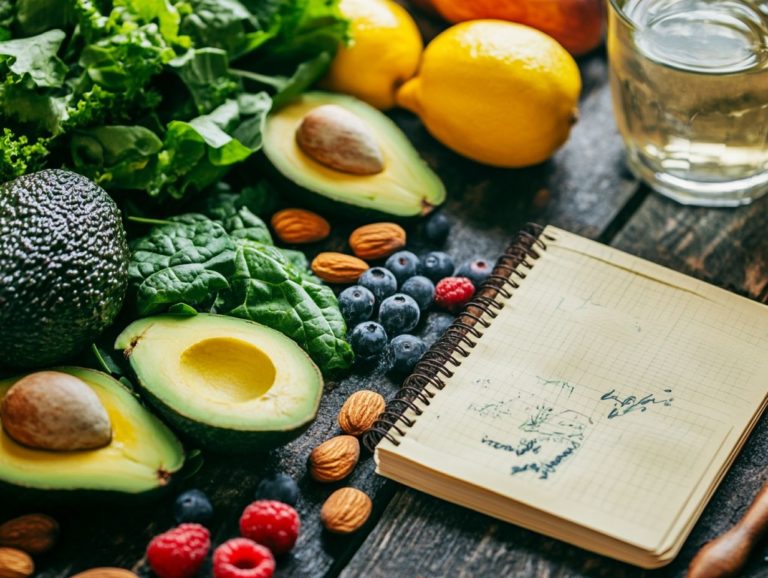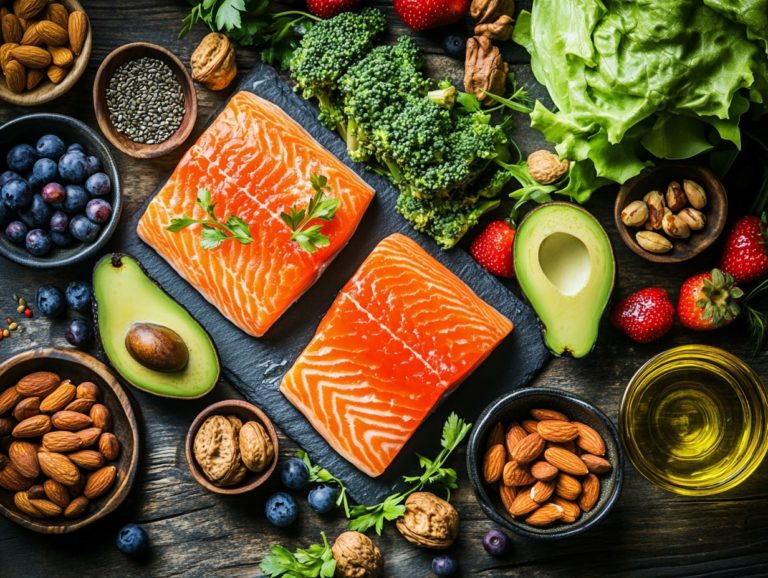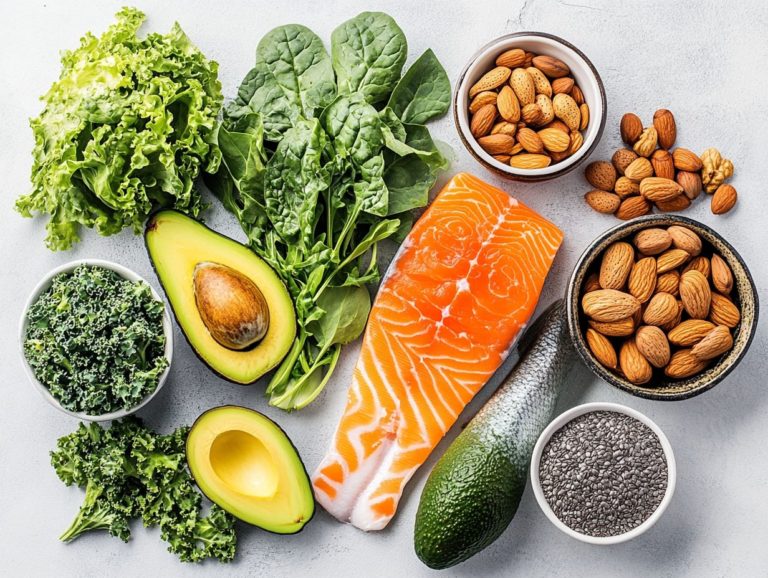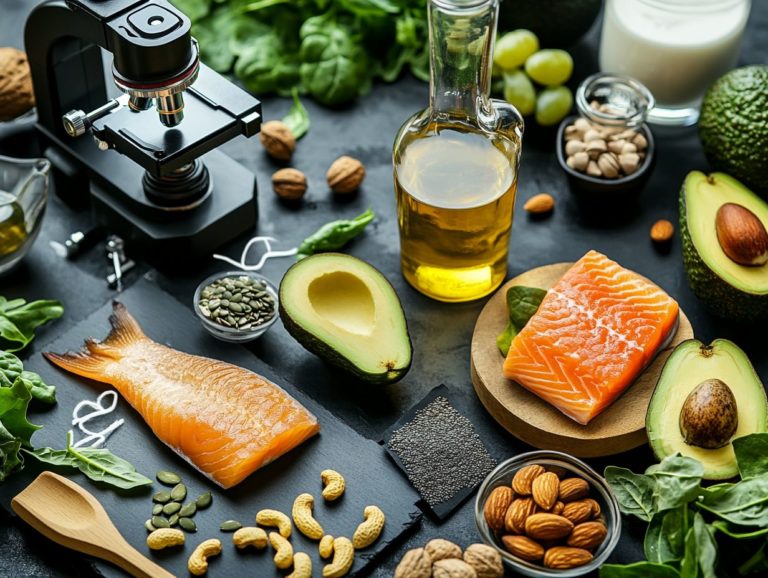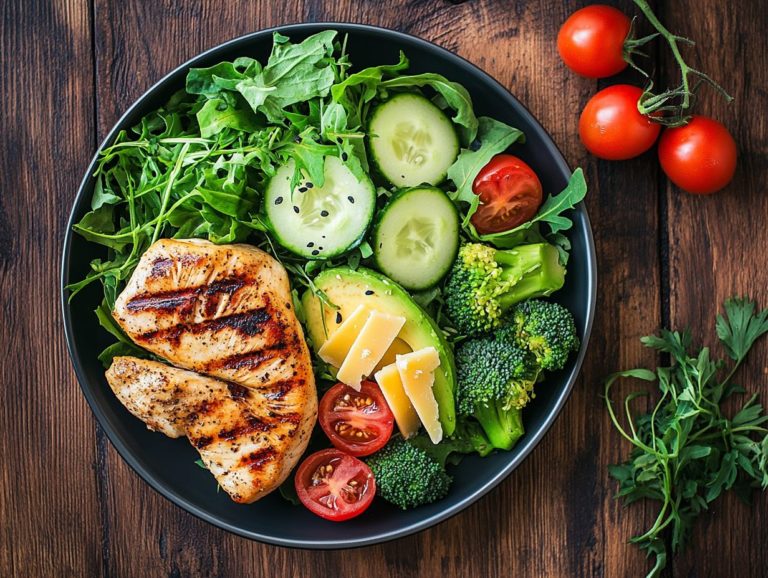Keto Diet: Fiber Requirements Explained
The keto diet has surged in popularity due to its potential for weight loss effects and enhanced overall health. However, there’s a critical aspect that often gets overlooked: fiber intake and its impact on nutrient absorption.
As you embark on your keto journey, grasping your fiber requirements is essential for maintaining digestive health and overall well-being. This article delves into the importance of fiber in a ketogenic lifestyle, outlining the ideal amount to consume and the best sources to keep your meals both nutritious and enjoyable, according to dietary guidelines.
It also sheds light on the risks associated with insufficient fiber and offers practical tips to boost your intake while remaining in ketosis. Uncover how to elevate your keto diet for improved health!
Contents
- Key Takeaways:
- What Is the Keto Diet?
- What Are the Fiber Requirements on the Keto Diet?
- How Much Fiber Should You Consume on the Keto Diet?
- What Are the Best Sources of Fiber on the Keto Diet?
- 2. Avocados
- 3. Nuts and Seeds
- 4. Berries
- What Are the Potential Risks of Not Meeting Fiber Requirements on the Keto Diet?
- How Can You Increase Your Fiber Intake on the Keto Diet?
- Fiber Intake on a Ketogenic Diet
- FAQs
- What Is the Keto Diet and Why Is It Important to Meet Your Dietary Fiber Requirements?
- How Much Dietary Fiber Do I Need to Consume on the Keto Diet?
- What Are Some High-Fiber Foods That Are Suitable for the Keto Diet?
- Can I Take Fiber Supplements on the Keto Diet?
- How Can I Track My Daily Dietary Fiber Intake on the Keto Diet?
- What Happens If I Don’t Get Enough Dietary Fiber on the Keto Diet?
- Take Action!
Key Takeaways:
What Is the Keto Diet?
The keto diet, or ketogenic diet, is a meticulously crafted eating plan that emphasizes high fat and low carbohydrate intake, designed to usher your body into a metabolic state known as ketosis. In this ketosis state, your body efficiently shifts its energy source from carbohydrates to fat, burning body fat for fuel.
With a substantial reduction in carbohydrate consumption typically to about 20-50 grams of net carbs per day you replace those carbs with wholesome fats. This approach not only facilitates weight loss but also promotes enhanced metabolic health. By cutting back on sugar and embracing healthy fats, you may unlock a host of health benefits, including improved insulin sensitivity, better insulin response, and lower blood sugar levels.
What Are the Fiber Requirements on the Keto Diet?
Fiber requirements on the keto diet are vital for maintaining your digestive health and ensuring that you absorb nutrients adequately while keeping your carbohydrate intake low. While the spotlight is often on high fat and protein consumption, it s equally essential for you to meet your fiber needs to prevent any potential deficiencies that can arise from a low-carb lifestyle and to adhere to recommended dietary guidelines.
By targeting fiber-rich food sources, you can reap the numerous health benefits associated with sufficient dietary fiber, ultimately enhancing your overall well-being and supporting effective weight management, including improved digestion and reduced health risks.
Why Is Fiber Important on the Keto Diet?
Fiber is absolutely essential in the keto diet. It maintains your digestive health, facilitates regular bowel movements, and helps you manage your carbohydrate intake and overall nutrient needs, which are already significantly lowered.
Embracing a high-fiber diet can amplify your weight loss efforts by promoting satiety and keeping your hunger levels in check, ultimately leading to better weight management and a host of health benefits. Ensuring you get enough fiber can prevent common issues like fiber deficiency, which often sneaks up on those following a low-carb lifestyle and affects your GI tract.
This is crucial because skimping on fiber can result in digestive problems like constipation and can also pose broader health risks, including heightened chances of heart disease and certain gastrointestinal disorders.
By incorporating fiber-rich foods into your keto diet, you can enhance your gut health, which supports nutrient absorption and bolsters your immune function. Consider adding fiber supplements if needed.
Moreover, fiber plays a significant role in regulating blood sugar levels, making it critical for anyone seeking weight loss and optimal metabolic health. Striking the right balance of fiber within the parameters of the keto diet allows you to adopt a more sustainable approach to your health and wellness journey, potentially reducing the risk of heart disease and cancer.
How Much Fiber Should You Consume on the Keto Diet?
If you’re following the ketogenic diet, aiming for 25 to 30 grams of fiber each day is wise. This helps balance your low carbohydrate intake while keeping your digestive health in check. Getting enough dietary fiber is crucial for promoting regular bowel movements and preventing any uncomfortable digestive issues. Since the keto diet is all about high fat and low carbs, incorporating fiber-rich foods is essential for effectively meeting your daily nutrient needs.
This recommendation is especially important for certain groups, including adults and athletes, who may have different requirements based on their lifestyle and energy expenditure. For instance, athletes might find that a higher fiber intake supports their increased energy demands and physical activity. Older adults may prefer fiber sources that are easier to digest.
To seamlessly weave fiber-rich foods into your keto meal plan, think about adding ingredients like avocados, chia seeds, and leafy greens. Not only do these options help you hit your fiber goals, but they also fit perfectly within the diet s macronutrient profile. By including these foods, you can relish meals that are both satisfying and nutritionally balanced, enhancing your overall dietary management.
What Are the Best Sources of Fiber on the Keto Diet?
In your pursuit of a successful keto diet, the finest sources of fiber will be low-carb vegetables, nuts, seeds, and select fruits.
These foods provide essential fiber while keeping your carbs and calories low. Not only do these options enhance your digestive health, but they also offer a wealth of nutrients that bolster overall wellness and aid in weight loss. By thoughtfully incorporating these sources into your meal plan, you can relish the myriad health benefits of fiber without surpassing your carbohydrate limits.
1. Non-starchy Vegetables
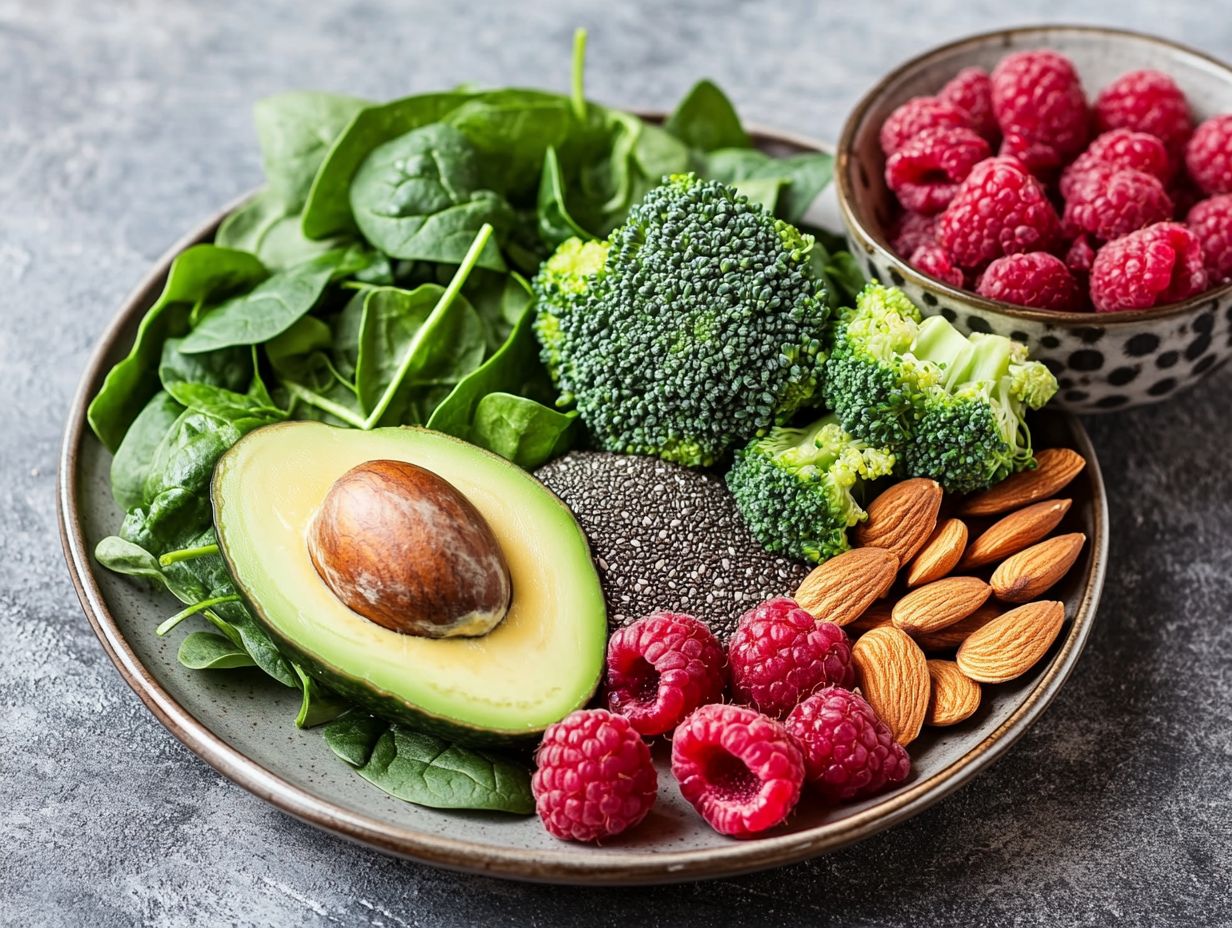
Non-starchy vegetables rank high among the best fiber-rich foods to embrace in your keto diet. They re low in carbs and packed with essential nutrients, all while delivering a generous helping of dietary fiber. Think of options like spinach, kale, broccoli, and zucchini these veggies support healthy digestion, boost nutrient absorption, and deliver antioxidants that enhance your overall health. By integrating these vegetables into your meals, you can optimize your fiber intake while keeping those carbohydrate levels in check, perfect for maintaining ketosis.
These vegetables lend themselves effortlessly to a variety of dishes, from refreshing salads to hearty soups, making them incredibly versatile for your meal prep. For example, saut ed spinach can be a delightful side dish, while kale can be seamlessly blended into smoothies for an extra nutrient boost. Broccoli florets are fantastic in stir-fries, and zucchini noodles can step in for traditional pasta, helping you keep those carb counts low.
With their vibrant colors and appealing textures, these options do more than just contribute to a balanced ketogenic diet they elevate flavor profiles, making every meal both delicious and health-conscious.
Always check labels to keep your carb counts in check.
2. Avocados
Did you know that avocados can transform your meals? They re not only delicious but also packed with nutrients. Avocados are a gem in the world of nutrition. They offer a rich source of healthy fats and an impressive amount of fiber, making them an ideal companion for your keto diet.
Each avocado delivers a substantial boost of dietary fiber, helping you hit your daily fiber goals while supporting heart health. This is thanks to their generous monounsaturated fat content. By incorporating avocados into your meal plan, you not only enhance the flavor of your dishes but also boost their nutrition, ensuring you meet your overall nutrient needs on the ketogenic diet.
Beyond their nutritional benefits, avocados are remarkably versatile. They can seamlessly fit into an array of dishes, from luscious guacamole to vibrant salads and smoothies. Their delicate flavor harmonizes beautifully with both savory and sweet ingredients, offering a delightful texture that elevates any meal.
With their rich nutrient profile, adding avocados to your diet can support your weight management goals. They promote a feeling of fullness, making them an excellent choice for anyone following strict dietary guidelines. For those on a keto journey, avocados play a significant role in meeting your daily fat requirements.
They also deliver essential vitamins and minerals like potassium, vitamin E, and folate. This enriches your overall dietary experience and supports nutrient absorption.
3. Nuts and Seeds
Nuts and seeds are not just a treasure trove of healthy fats; they also serve as fantastic sources of dietary fiber. Consider options like chia seeds, flaxseeds, almonds, and walnuts. These can elevate your fiber intake while delivering essential nutrients and promoting a sense of fullness.
Incorporate a variety of nuts and seeds into your meals or snacks. This way, you can meet your fiber needs and enjoy their health benefits. By thoughtfully including these healthy oils, you contribute to overall well-being.
Integrating these fiber-rich delights into your ketogenic diet can be both simple and enjoyable. For example, chia seeds can be blended into your favorite smoothies or transformed into delightful puddings. Meanwhile, flaxseeds can enhance baked goods or add a delightful crunch to salads.
Almonds make for a convenient on-the-go snack and can even be transformed into almond flour for gluten-free culinary adventures. Walnuts shine with their omega-3 fatty acids and can be tossed into yogurt or oatmeal for a nutritional boost.
Don t hesitate to get creative with different combinations! Consider healthy fats like coconut oil or avocado. This not only amplifies your nutrient intake but also keeps your meals engaging and exciting.
4. Berries
Berries, including raspberries, blackberries, and strawberries, are among the few low-carb fruits you can truly savor on the keto diet. They offer a satisfying sweetness while packing essential nutrients and antioxidants. This makes them an excellent choice for maintaining a healthy fiber intake and optimal insulin response.
Rich in vitamins like C and K, as well as beneficial minerals, berries contribute significantly to your overall health. They help manage your blood sugar levels. Their high fiber content supports digestive health, an important consideration on low-carb diets.
There are countless creative ways to enjoy these fruits. Add them to smoothies, whip up keto-friendly desserts, or sprinkle them over salads for an invigorating flavor boost. You could even melt berries with a hint of coconut oil to create a delectable topping for pancakes or yogurt.
Berries truly make for a vibrant addition to your keto lifestyle. Don’t miss out on their benefits, as they offer both taste and health advantages that you won’t want to skip!
What Are the Potential Risks of Not Meeting Fiber Requirements on the Keto Diet?
Are you getting enough fiber on your keto diet? When you neglect to meet your fiber requirements and dietary guidelines on the keto diet, you face significant health risks, including constipation, nutrient deficiencies, and a heightened risk of chronic diseases such as heart disease and diabetes.
Fiber is crucial for maintaining optimal digestive health and nutrient absorption. Inadequate fiber intake can impair your body’s ability to absorb essential nutrients, which could lead to more extensive health issues down the line.
Prioritizing fiber is not just a dietary choice it s a vital component of your overall well-being.
1. Constipation
Constipation is a common challenge you might encounter while following the keto diet, primarily due to the reduced fiber intake that comes with cutting down on carbohydrate-rich foods. Without sufficient dietary fiber, your digestive system may struggle to function efficiently, leading to uncomfortable symptoms and potential complications. To mitigate this risk, it’s essential to actively incorporate fiber-rich foods into your meal plan, ensuring regular bowel movements and promoting overall digestive health and nutrient absorption.
Fiber plays a vital role in maintaining bowel regularity. It adds bulk and aids the GI tract, facilitating the passage of stool through your intestines. When fiber absorption is lacking, as often happens on a keto diet, you may find yourself dealing with hard, dry stools that are difficult to pass, ultimately contributing to constipation.
To combat this, focus on integrating non-starchy vegetables and fresh vegetables into your meals, such as:
- Leafy greens: Packed with vitamins and minerals, they are low in calories and high in fiber.
- Broccoli: A great source of fiber and essential nutrients.
- Cauliflower: Low in carbs and high in fiber content.
Including nuts and seeds can also be beneficial. Don t forget the importance of staying hydrated, and consider periodic fiber supplements and monitoring food labels to further alleviate symptoms, ensuring that your digestive system remains operational and comfortable.
2. Nutrient Deficiencies
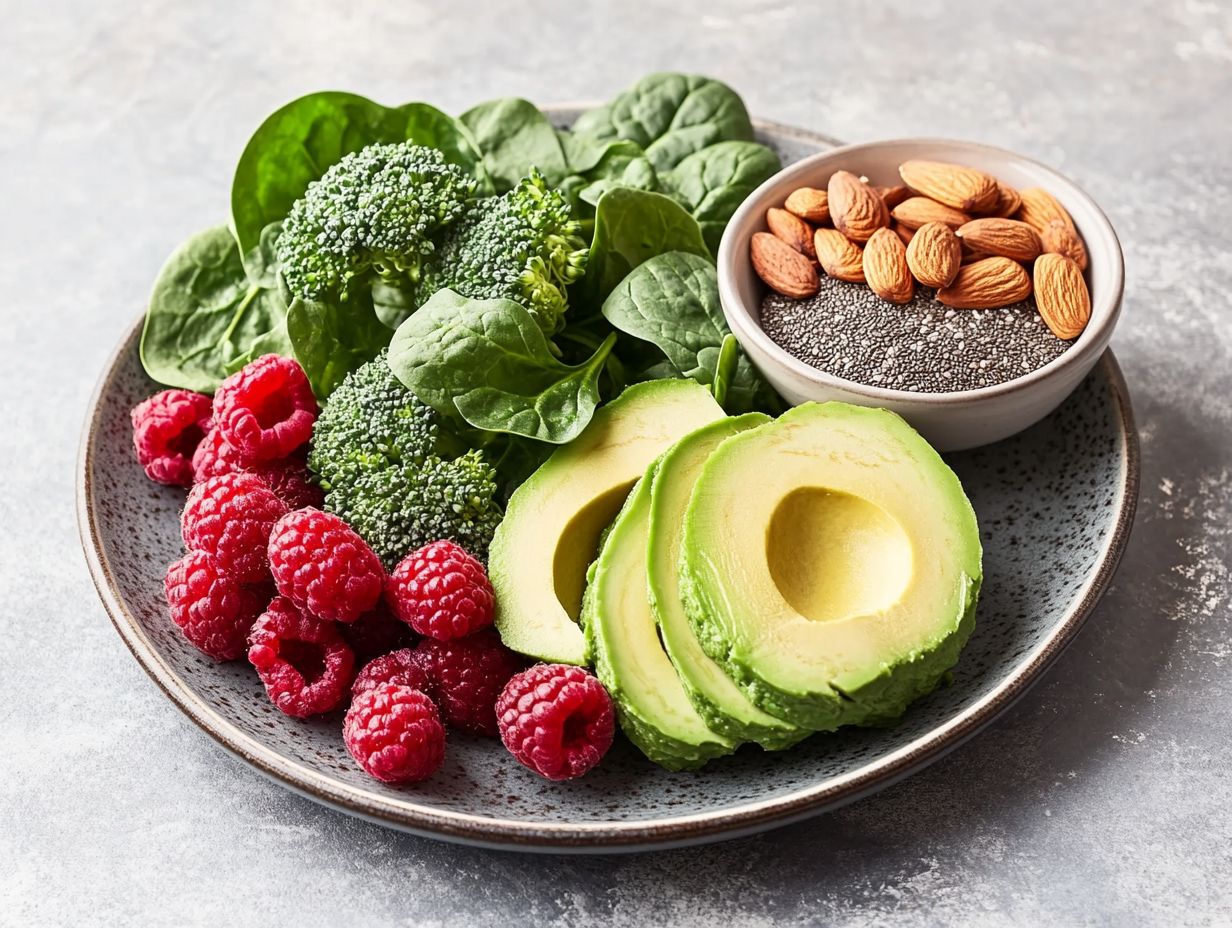
A lack of sufficient fiber in your diet can lead to nutrient deficiencies, as you might overlook the essential vitamins and minerals found in fiber-rich foods. This oversight can ultimately impact your overall health and wellness.
When you’re following a low-carb diet, it becomes crucial to prioritize foods rich in nutrients that provide both fiber and the essential nutrients necessary for maintaining metabolic health and protein consumption. Neglecting these dietary needs could expose you to long-term health risks and disruptions in how your body processes food, including weakened immunity and increased vulnerability to chronic diseases.
Fiber-rich foods, such as leafy greens, avocados, nuts, and ketogenic foods are brimming with vital nutrients like potassium, magnesium, various B vitamins, and healthy carbohydrates, all of which play a significant role in your body s physiological functions.
For anyone adhering to a keto diet, it s crucial to strike a balance immediately to avoid serious health risks by incorporating a variety of these nutrient-dense options to avoid deficiencies. Careful meal planning and the consideration of supplements can help bridge any gaps in your nutrient intake, allowing you to enjoy the many benefits of a low-carb lifestyle, including weight loss effects while supporting your overall well-being.
A thoughtfully constructed meal plan ensures your energy levels remain stable and promotes a healthier approach to eating that aligns with your dietary restrictions.
3. Increased Risk of Chronic Diseases
Inadequate fiber intake on the keto diet can elevate your risk of chronic diseases, including cancer and epilepsy, as fiber plays a crucial role in regulating blood sugar levels, supporting heart health, maintaining how your body processes food, and overall nutrition. Don t wait until it s too late to prioritize fiber intake!
When you skimp on fiber, you may find yourself facing higher blood cholesterol levels, poor how well your body responds to insulin, and increased body fat both significant risk factors for conditions like diabetes and heart disease. Thus, prioritizing fiber intake is essential not just for your digestive health but also for lowering your chances of developing chronic illnesses over time.
Numerous long-term studies have underscored the link between low fiber consumption and rising health issues, with fiber-rich foods often associated with lower rates of obesity and better hypertension. For example, diets abundant in whole grains, fruits, and vegetables, as recommended by nutritional guidance, not only deliver vital nutrients but also encourage the growth of healthy gut bacteria, which can positively affect your overall metabolic function.
To tackle fiber deficiency, consider weaving a variety of high-fiber foods, such as legumes, nuts, and seeds, into your meals. Increasing your water intake along with fiber helps amplify its benefits, promoting a healthier digestive system, better dietary management, and supporting your long-term well-being.
How Can You Increase Your Fiber Intake on the Keto Diet?
Increasing your fiber intake on the keto diet is crucial for maintaining your digestive health and preventing any complications that can arise from fiber deficiency.
By carefully choosing a diverse array of low-carb vegetables, nuts, seeds, and fiber-rich foods into your meals, while monitoring your calorie intake, you can easily boost your daily fiber intake and meet your nutritional needs while staying true to the principles of a ketogenic lifestyle and maintaining ketosis.
With careful meal preparation and planning, you can seamlessly meet your fiber requirements without surpassing your carbohydrate limits or disrupting your ketosis state. For more insights, check out keto diet and fiber intake.
1. Incorporate More Low-carb Vegetables
Incorporating more low-carb vegetables into your diet is one of the most effective ways to boost your fiber intake on the ketogenic diet. Vegetables like spinach, broccoli, and cauliflower aren t just low in carbohydrates; they re also rich in fiber, which is essential for maintaining digestive health, nutrient needs, and overall well-being.
By making these vegetables a staple in your meals, you ll enhance your fiber content while enriching your diet with essential vitamins, minerals, and healthy fats that support your health goals. Embracing their versatility can transform simple dishes into nutritious powerhouses with substantial health benefits.
For example, saut ed spinach makes a delightful base for an omelet or can be tossed into a leafy green salad that contributes to your vegetable intake. Cauliflower can be roasted or riced, providing a clever substitute for higher-carb grains. Meanwhile, steamed broccoli florets tossed with olive oil and garlic create a flavorful side that elevates any meal.
Don t overlook the option of blending these veggies into smoothies, adding them to soups, or including them in meal delivery services, offering hidden servings of fiber without sacrificing taste. By creatively weaving these low-carb vegetables into your daily meals, you can enjoy the benefits of increased fiber intake while staying true to the principles of a ketogenic lifestyle.
Fiber Intake on a Ketogenic Diet
2. Add Chia or Flaxseeds to Your Meals
Incorporating chia or flaxseeds into your meals is a great way to elevate your fiber intake while following a ketogenic diet. These nutrient-rich seeds are not only high in healthy fats but also contain a substantial amount of fiber, supporting digestive health and promoting meal satisfaction and weight management.
Snack time? Try adding these seeds to your energy balls or homemade granola bars for a delightful crunch! Whether you sprinkle them on salads, blend them into smoothies, or mix them into yogurt, chia and flaxseeds can easily fit into your daily routine, helping you achieve your fiber goals.
Both chia and flaxseeds are packed with soluble fiber, which aids in regulating bowel movements, lowering cholesterol levels, and stabilizing blood sugar.
By using them as egg substitutes in baking or incorporating them into your oatmeal, you can significantly enhance the nutritional profile and fiber content of your breakfast or any meal. Their versatility guarantees that you can enjoy the many health benefits of these tiny powerhouses without sacrificing flavor.
3. Try Psyllium Husk Supplements
Psyllium husk supplements provide a convenient way to boost your fiber intake and support your digestive health on the keto diet. As a soluble fiber, psyllium husk helps maintain regular bowel movements and alleviates constipation, making it an excellent option if you’re struggling to meet your fiber needs through food alone. It’s especially beneficial for those monitoring their carbohydrate intake and aiming to stay in a ketosis state.
Incorporate psyllium husk into your daily routine to achieve your necessary fiber intake for better health, supporting your GI tract and overall metabolic health. For those following a keto lifestyle, where traditional high-fiber foods like grains and fruits are limited, psyllium husk presents a straightforward solution.
Typically, a dosage of 5 to 10 grams per day can be effective. It’s easy to take just mix it with water, smoothies, or yogurt. This approach helps manage your carbohydrate intake while ensuring you get enough fiber.
To maximize its benefits, drink plenty of water throughout the day. This aids digestion and helps avoid any potential gastrointestinal discomfort. Enjoy the advantages of improved gut health while adhering to the macronutrient constraints and dietary guidelines of a keto diet.
4. Consume Low-Carb Fruits in Moderation
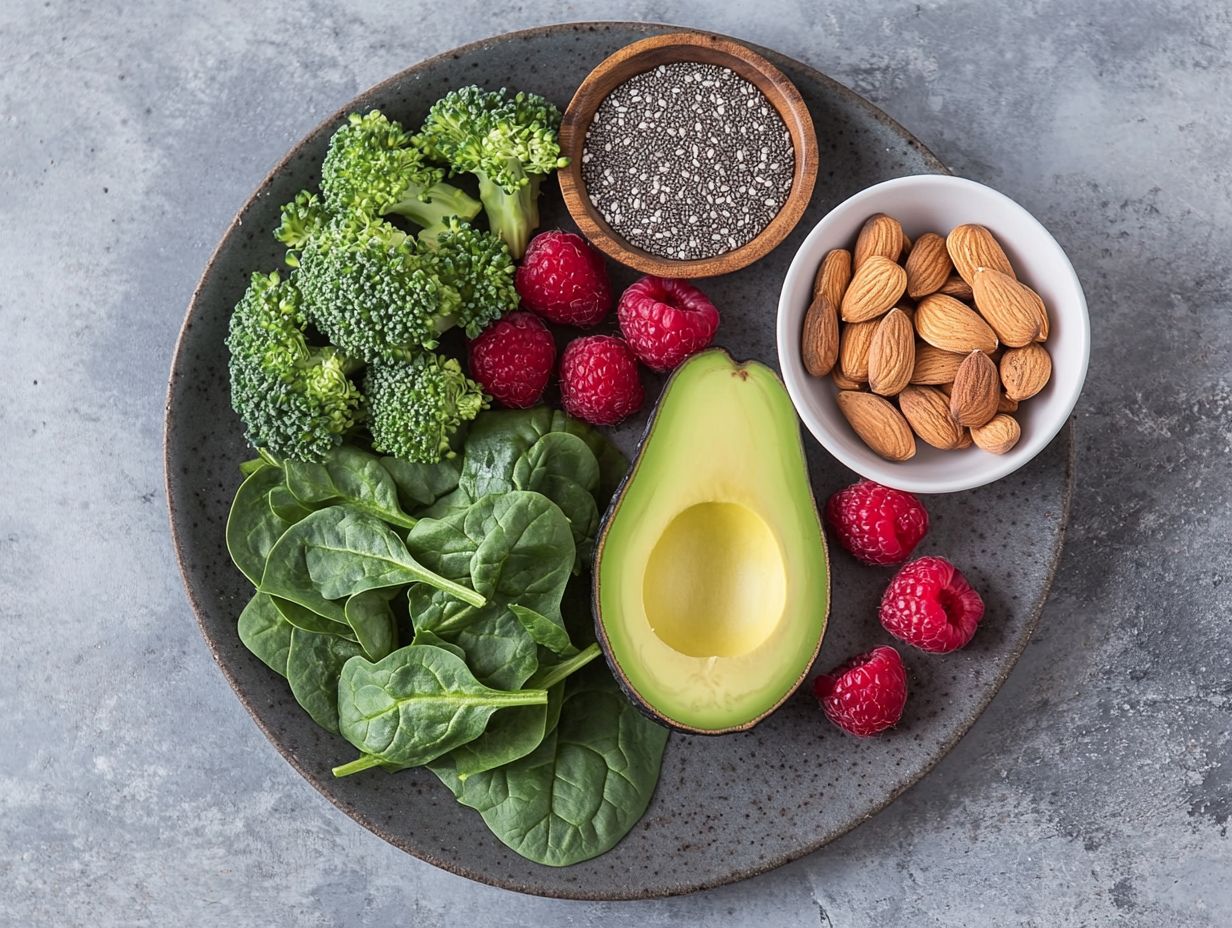
Consuming low-carb fruits in moderation can be a fantastic way to boost your fiber intake while adhering to the keto diet. Fruits such as berries, avocados, and tomatoes not only have low carbohydrate content but are also rich in fiber and essential nutrients, making them valuable additions to your meal plan.
For example, tossing a handful of raspberries or blackberries into your breakfast smoothie can provide a delightful burst of flavor and positively contribute to your daily fiber intake. Avocados are wonderfully versatile; you can mash them onto low-carb bread or toss them into salads, giving your dishes a creamy texture along with the healthy fats you crave. Tomatoes can elevate savory dishes, enhancing their flavor while delivering important vitamins.
It’s crucial to keep an eye on portion sizes, as even these low-carb options can accumulate and impact your overall ketogenic diet objectives. By balancing variety with moderation, you can savor these nutritious fruits while staying compliant with your diet and managing your calorie intake.
FAQs
What Is the Keto Diet and Why Is It Important to Meet Your Dietary Fiber Requirements?
The Keto Diet is a low-carb, high-fat diet that aims to put your body in a state of burning fat called ketosis. Meeting your fiber requirements is important on this diet because it helps maintain a healthy digestive system and regulates blood sugar levels.
Additionally, fiber keeps you feeling full, which can help you stick to your dietary goals.
How Much Dietary Fiber Do I Need to Consume on the Keto Diet?
The recommended daily fiber intake for adults is 25-30 grams. However, on the Keto Diet, it is recommended to consume around 20-25 grams of dietary fiber per day. This amount may vary based on your individual needs and goals.
What Are Some High-Fiber Foods That Are Suitable for the Keto Diet?
Some high-fiber foods that are suitable for the Keto Diet include:
- Non-starchy vegetables such as broccoli, spinach, and avocado
- Nuts and seeds such as chia seeds and almonds
- Berries like raspberries and blackberries
These fiber-rich foods can help you meet your dietary needs while following a low-carb approach. Incorporating these foods into your meals can enhance both flavor and nutrition.
Can I Take Fiber Supplements on the Keto Diet?
Yes, you can take fiber supplements on the Keto Diet to help meet your daily requirements. However, it is best to prioritize getting your fiber from whole food sources first. Always consult with your healthcare provider before adding any supplements to your diet.
How Can I Track My Daily Dietary Fiber Intake on the Keto Diet?
There are many apps and online trackers available to help you monitor your daily fiber intake. You can also keep a food journal or use a calculator to determine the fiber content of the foods you consume.
Reading food labels can also help ensure you meet your nutritional goals.
What Happens If I Don’t Get Enough Dietary Fiber on the Keto Diet?
Not getting enough dietary fiber on the Keto Diet can lead to constipation, bloating, and other digestive issues. It can also make maintaining a healthy weight more difficult.
Fiber deficiency impacts your digestive health and overall well-being. Prioritizing your fiber intake is crucial for your health on the Keto Diet!
Take Action!
Start planning your meals for the week, focusing on incorporating high-fiber foods that fit your Keto lifestyle. Try a new high-fiber recipe or snack on berries, nuts, and non-starchy vegetables to boost your fiber intake!

